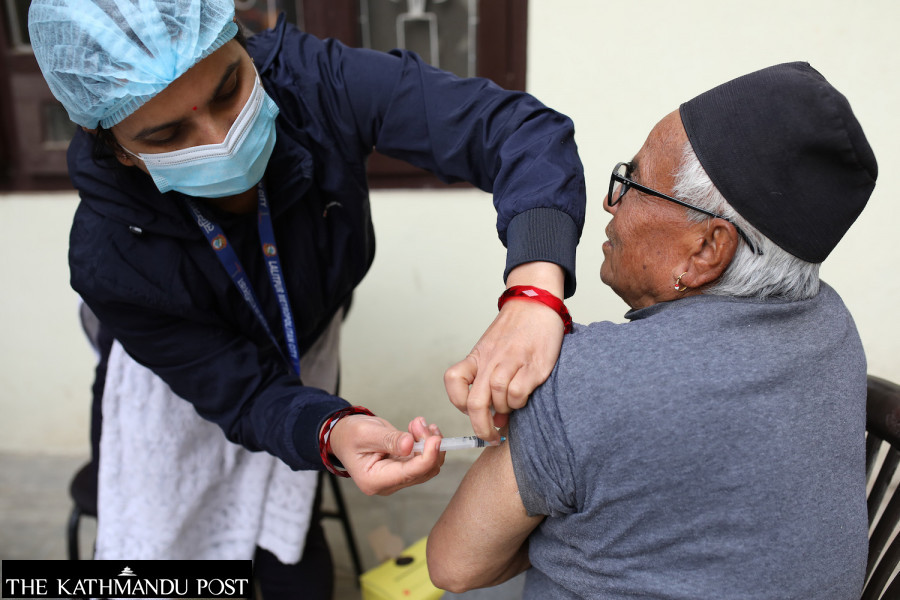Health
AstraZeneca to be administered as second dose and booster
The Health Ministry decision comes amid shortage of the Vero Cell vaccine.
Arjun Poudel
Amidst shortages of the Vero Cell vaccine, the Ministry of Health and Population has decided to provide the AstraZeneca vaccine as a second dose and booster.
The decision to administer AstraZeneca as second dose and booster is in line with the recommendation of the World Health Organisation’s Strategic Advisory Group of
Experts on Immunisation, Health Ministry officials said.
A meeting of the National Immunisation Advisory Committee held on Wednesday had also recommended vaccine mix and match for second doses and booster shots.
“As per the recommendation of the World Health Organisation’s Strategic Advisory Group of Experts on Immunisation and the National Immunisation Advisory Committee, a ministerial level decision was taken on Friday to administer AstraZeneca as the second dose,’ reads a statement issued by the Family Welfare Division under the Department of Health Services.
As per the decision, Covishield/AstraZeneca vaccine will be administered as a booster to those above 60, who were inoculated with Covishield/AstraZeneca, Moderna, Pfizer-BioNTech or Vero Cell vaccines in a primary series (people who took two shots).
Likewise, Covishield/AstraZeneca vaccine can be administered as a second dose if authorities lack the vaccine of the same manufacturer after administering that as the first dose.
The ministry has also decided to administer Covishield/AstraZeneca vaccine to those, who were administered with Covishield/AstraZeneca, Vero Cell, Moderna, Pfizer vaccine abroad.
Research has shown that such ‘mix and match’ regimens are highly effective at preventing Covid-19—roughly matching or even exceeding the performance of mRNA vaccines like Pfizer-BioNTech and Moderna.
Scientists around the world have been discussing vaccine cocktails and trying to figure out the best mix and match for better protection against the coronavirus.
Administering a different Covid-19 vaccine after a single dose of the AstraZeneca or Pfizer-BioNTech vaccine is safe and effective and could boost the immune response, a study of 1,000 volunteers has found, according to a report published on December 7 in the British Medical Journal.
The results, reported in the medical journal Lancet, showed that having a dose of the Moderna vaccine after an initial AstraZeneca or Pfizer dose induced a higher binding and neutralising antibody response than seen after two doses of either AstraZeneca or Pfizer.
Studies have shown that people who receive two different Covid-19 vaccines generate potent immune responses, with side effects no worse than those caused by standard regimens, according to a report published in the science journal Nature in October.
Nepal so far has received 43,398,640 doses of vaccines, including the AstraZeneca, Vero Cell, Moderna, Janssen and Pfizer-BioNTech types.
The government, however, has run out of its stock of Vero Cell vaccines.
Nepal has so far received 19,736,400 doses of the Chinese Vero Cell vaccine.
Of them 9,746,270 doses have been administered as first doses; 7,821,406 doses as second doses and 64,406 doses have been given as booster shots until Tuesday.
Of the total Vero Cell vaccine doses Nepal received, the government purchased 10 million doses through a non-disclosure agreement from the vaccine manufacturer Sinopharm. The consignments arrived on various dates. An additional 5,936,400 doses were bought through COVAX’s cost-sharing scheme.
China has donated 3.8 million doses of Vero Cell so far.
Nepal started administering booster shots against Covid-19 on January 4 after cases started to surge, driven by the new highly contagious Omicron and Delta which is the predominant variant in the country.
Nepal’s active cases as of Friday stand at 89,941.
The Health Ministry said on Friday that 13,734,390 were fully vaccinated so far.




 11.84°C Kathmandu
11.84°C Kathmandu















